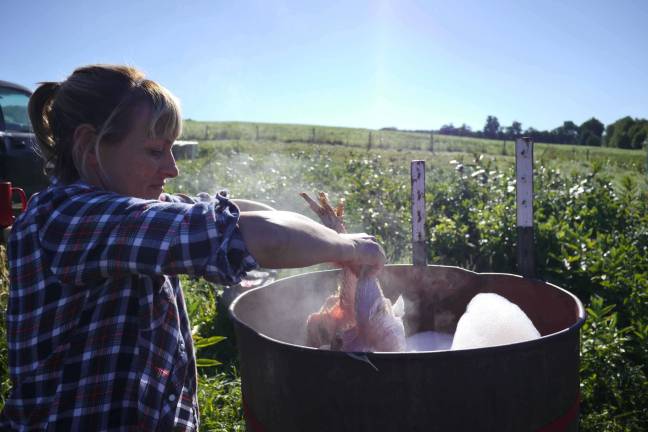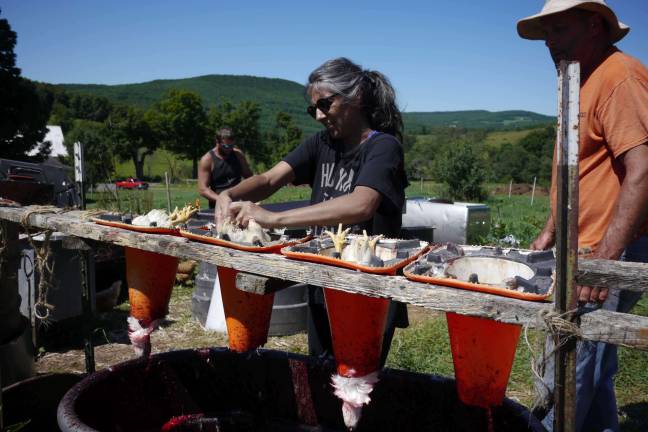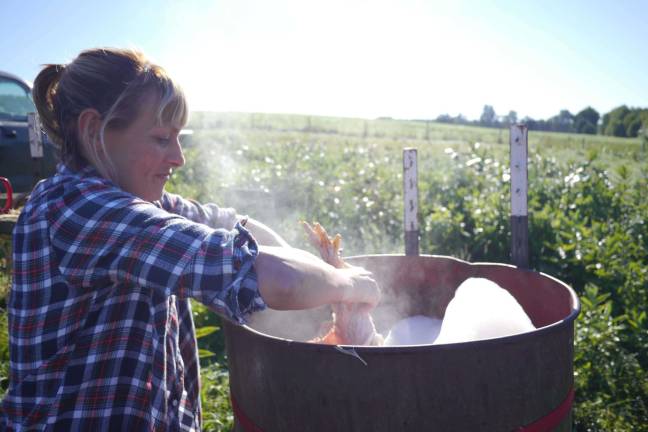A first kill



After meeting once, two women embark on a singular road trip
By Laura Wood and Adeeb Mohiuddin
PQ: I now hold this truth to be self-evident: that it is vital to know where my food comes from.
Laura: Traveling alone, you surrender to the unknown. The first time I stayed in the Warren family’s cabin, they invited me to eat with them. Asian soup with chicken, sautéed stinging nettles, and a bottle of wine on the table. We talked for hours, and as we dipped into the languor of the night, they said I should come back and help on the farm.
“What would I do?”
“Castrate pigs? Kill chickens?” Straight faced. “You’re eating our chicken right now. Why not know the process?”
Yes… Why not? I’ve never killed a thing in my life, but I eat meat. I believe there is great merit in creating deeper bonds with the choices that we make, whatever they may be. Without that, we don’t own them, and not owning your own actions is not knowing yourself.
That’s how I ended up driving back to the farm, my new friend Adeeb in tow. We drove up the drowsy contours of swaying hay fields into the Catskill foothills, talking about just about everything except for what we were about to do.
That evening, after another glowing dinner with the family and before saying goodnight, I confessed I was nervous about the next day.
“Be confident and quick,” said Tom.
That night, my thoughts sucked at me, and a cat outside cried for hours to be let in. Morning came with moaning goats on our front porch, stomping on the planks and saturating the air with their singular stench. It was time to get up and start.
Adeeb:
There is nothing like a road trip with a relative stranger to hurry intimacy. I’d met Laura only once at a favorite local farm-stand, and after a brief chat about beloved mutual friends, farm-life and moving in and out of cities, she invited me to write a story with her. And just like that, I moved in the direction of yes, trusting that the journey would be as important as the destination.
We arrived at Stone & Thistle Farm in the evening, greeted by Tom, his son, Shane, and a bevy of animals roaming freely through meadows. Queen Anne’s lace and chicory lined our path to a perfectly appointed cabin, replete with blankets, a fridge stocked with fresh milk, eggs, berries, granola, coffee; solar shower, composting toilet; horses grazing in front of our window alongside a creek. Heaven.
Dinner with Tom, Denise and Shane was lively. I filled my plate with brisket, the most delectable charred corn salad, and fresh goat milk ice cream and pie for dessert. Time stretched as it does when you’re willing to be right where you are.
Maybe it was the anticipation, but neither Laura nor I could sleep. We stayed up for hours catching up as though it were our last night at summer camp.
Part II
Laura:
It was a rough start with what felt like next to no sleep, and a busted French press that we finally gave up on. The air of the early morning was still traced with the chill of an unusually cold night, crisp with no humidity, like mornings in California.
“We started without you,” said Tom with a smile, seeing us come up the hill.
He was there with two others, standing next to a large stainless steel table with a deep rim. Stacked in the grass were yellow plastic crates filled with chickens sitting quietly. Behind Tom, there were four traffic cones turned upside-down in a wooden brace on stands. Inside the cones and were four dead chickens, bleeding out into a large plastic bin beneath. Without my morning coffee, this world was barely making sense.
“Tom, your French press is broken. I need to beg for coffee.”
“Go down and get some from Denise and tell her about the French press.” He opened the door to one of the crates and pulled out a squawking chicken.
We went down for coffee, only to be sent back up while it was brewing. I was slightly disappointed to miss the reprieve.
“One of you will kill, scald and pluck,” said Tom. “The other will eviscerate at the table. Who wants to kill first?”
Swollen pause… Damn it. “I’ll kill first.”
The point between life and death is a sort of lazily erased pencil line. When the chickens go upside down, they get so still. They don’t squawk. They don’t move. Even through the cutting, they remain this way. It’s impossible to pinpoint the switch. I thought to myself, “maybe they are sparing me.”
I took a crying bird out of a crate, turned it upside down by the feet, put it in a cone and pulled its head through the bottom.
“We’re going to do this one together,” said Tom. “Hold the knife blade up. Feel for the spine and cut in front.”
His hand over mine, he guided me with the confidence that I lacked, and moved quickly. We plunged the blade into the neck, twisted clockwise, and cut our way out the front.
“You cut the arteries and it bleeds fast. That’s it.” That’s it for the bird, but the body convulses for a time before giving way to the stillness of death.
I faltered three times on my own. Getting frustrated and tense, I looked at Tom and said, “I can’t do it.”
“Yes, you can,” he said with the warmth of a patient teacher.
Holding an animal’s neck, feeling the warmth and life in it, knowing that you intend to kill it, is intense. I forced a shift. I focused on a target spot to puncture. I detached. Once the bird had bled out and was limp, even though it had feathers and a head, it was relatively easy. The scalding to loosen the feathers, the plucking, eviscerating, twisting and pulling off its head even, felt almost ordinary.
Adeeb:
Plunge the knife in. Twist. Cut at an angle to slice through the carotid arteries.
I’ve never done this before. I watch Tom. He moves deftly, with kindness and compassion. This is hard work.
I say my prayer, the one I’ve said so many times before, now with renewed meaning. “May all beings be free of suffering and the causes of suffering and may I, through my thoughts, my words, and my actions, bring that about.” I whisper it, alternating between holding tears back and letting them fall. I ask myself, “What brought me here?” And I answer: “You eat chicken! That’s why you’re here!” I felt compelled to get intimate with my choices.
Collect the bird, grasp firmly under the wings and legs to keep her calm, place her head down in a cone, hold her above the jaw. Breathe. Plunge the knife in. Twist. Cut at an angle to slice. Let her bleed out. Do it again. And again. And again. They writhe, twitch, defecate.
Take the bled-out birds, dip them in hot, not boiling, water. Hold them against a rubber wheel to pluck most of the feathers. Snap the heads off. Cut the feet at the joint. Slice through the neck. Disembowel. Keep your knife clean. Toss guts in the gut bucket, livers for dog food in the other bucket. Keep your bird clean. Truss her legs. Drop her in cold water. Rest.
Part III
Laura:
“What’s the difference between being a part of the process and being numb to it?” I asked Tom. He said that this is being a part of the process. I asked if a part of the process might be becoming a bit numb to it. He said sure. Maybe, yes. Tom and Denise’s son Reilly, who was one of the five of us helping process that day, interjected: “On small farms, you’ve raised the animals from birth to the end. That’s being part of the process.” This makes sense to me. It is the key difference maybe, between being a farmer who raises animals for food, and a large scale operation. One is a killing factory. The other encompasses all aspects of life. Participating in that cycle was a humbling and empowering experience. Humbling to feel connected to the animal that sustains you. Empowering to experience self-sufficiency in a way that few do.
Adeeb:
Death is brutal. Living is brutal. Eating is brutal. I prayed. I cried quietly. I tried to be swift. I now hold this truth to be self-evident: that it is vital to know where my food comes from.
Back in Kingston the next morning I ordered breakfast at a favorite vegetarian place. A few bites in I gasped, struck with a flashback of plunging a knife into a bird, thrusting and cutting. I pushed away the thoughts and turned my attention to my 3-year-old feeding birthday cake to my husband.
Later, my son asleep in his car seat, I gave in to the emotion that I couldn’t entirely access the day before in the midst of it all. There in my car, I wept, processed, grew yet more intimate with the parts of myself so shrouded and mysterious, so many questions that I don’t claim to have the answers to, not even yet for myself.
I freely admit that I’m in a steady state of low grade anxiety and the blissful ease I seek eludes me, mainly because of a heavy hand and need for control. I’m busy, plate full of things requiring my attention, like the needs of a child, a corporate job, farmhouse to rent out, a recent move, four dogs, three cats and a baby on the way. None of these are all that stressful in and of themselves. In reality I suspect that my “busy” is self-inflicted and designed to keep intimacy at bay.
At times I do give over to whatever may come. Like that day, rote in its beginnings, when Laura arrived in the nick of time, rescued me from the daily grind, and I was suddenly on my way to face the certainty of death.
If you are a seeker of the small farm experience, Stone & Thistle Farm in East Meredith, NY offers a slew of opportunities and classes, not all of them grisly. Stoneandthistlefarm.com.